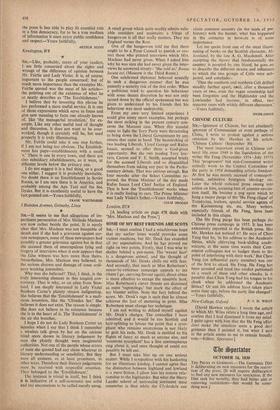SOME OF MY BEST FRIENDS ARE SCOTS SIR,—I must confess
I had a mischievous hope that my earlier letter would provoke some violent reactions, but Mr. Doak has exceeded all my expectations. And he has proved me right on two points. Firstly, that I was wise to shelter behind a pen-name. The 'weasel Scut' is a dangerous animal, and the thought of thousands of Mr. Doaks chills me with fear. And secondly, that much as Miss Robertson's smear-by-reticence campaign appeals to me (there I go, currying favour again), direct abuse is more effective to enrage the unsubtle Scot. Miss Robertson's clever thrusts are dismissed as mere `vapourings,' but mark the effect of my blunter sallies. Note the fury behind the scorn. Mr. Doak's rage is such that he almost achieves the feat of stuttering in print. Miss Robertson must change her technique.
I am not writing to defend myself against Mr. Doak's charges. The cowardice I have admitted, and it would be too Scottish and hair-splitting to labour the point that a syco- phant who remains anonymous is not likely to gain his ends. Mr. Doak is entitled to his flights of fancy as much as anyone else, and 'nauseous sycophant' has a fine contemptuous ring about it, and once thought of could not possibly be left out.
But I must take him up on one serious matter. While I sympathise with his hankering for an illustrious kinship, I cannot agree that the distinction between highland and lowland is a mere fiction. I allow him his remote rela- tionship to the highlander. But what the Harry Lauder school of nationalist sentiment must remember is that while the Clydesdale can claim common ancestry (in the mists of pre- history) with the hunter, what has happened in the centuries in betwtren is of some importance. Let me quote from one of the most illumi- nating of books on the Scottish character, My Scotland, by the late A. G. Macdonell. After accepting the theory that fundamentally the country is peopled by one blood, he goes on to describe the different strains and influences to which the two groups of Celts were sub- jected, and concludes: '
'Thus the southern and northern Celt drifted steadily further apart, until, after a thousand years or two, even the vague cousinship had been forgotten and the Highlander and the Lowlander had become, in effect, two separate races with widely different characters.' —Yours faithfully, HIGHLANDER










































 Previous page
Previous page